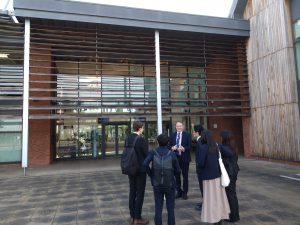 Two members of the Japan Local Government Centre (JLGC), Mr Ando and Mr Awata, recently participated in a study visit hosted by Wyre Forest District Council (WFDC) from 15-17 September in Kidderminster. The visit formed part of JLGC’s ongoing engagement programme with UK local authorities, aimed at deepening mutual understanding between Japanese and British local government systems. Over three days, the delegation observed council operations, service delivery, and governance practices while exchanging views with local officers and elected members.
Two members of the Japan Local Government Centre (JLGC), Mr Ando and Mr Awata, recently participated in a study visit hosted by Wyre Forest District Council (WFDC) from 15-17 September in Kidderminster. The visit formed part of JLGC’s ongoing engagement programme with UK local authorities, aimed at deepening mutual understanding between Japanese and British local government systems. Over three days, the delegation observed council operations, service delivery, and governance practices while exchanging views with local officers and elected members.
The programme began with site visits to Bewdley and Stourport, where the delegates observed local flood management facilities and a historic boatyard once used for transporting goods along the canal network. These visits provided valuable insight into how local authorities in the UK manage environmental and heritage assets while maintaining a strong link to community identity.
Back at Wyre Forest House (WFH), the council’s main offices, the JLGC visitors were given a guided tour and spent time with staff from the Finance and Planning sections to understand their daily work. They also took part in an informal discussion session with local government officers and councillors about organisational reform, leadership, and restructuring. The open exchange of views highlighted how British councils manage change through collaboration between elected members and professional staff.
On the second day, the delegation attended preparatory meetings for the upcoming council session, gaining first-hand experience of the procedures leading up to formal decision-making. A subsequent meeting with the Chief Executive of the District Council Network offered a wider view of how local authorities cooperate nationally to represent district-level interests.
The group also visited Hub House, a one-stop service centre supporting residents with council tax, housing, and related issues. Further sessions with staff from the Waste Collection, Housing, and Council Tax sections deepened their understanding of the UK’s integrated approach to frontline service delivery. After lunch, the delegation took a self-guided tour of Kidderminster before receiving an on-site briefing on the Old Court regeneration project – an initiative to repurpose a former courthouse into a flexible event space and local business hub.
Later that afternoon, they observed two significant meetings: the Group Leaders’ meeting, where councillors responsible for specific areas reported on progress, and the Cabinet meeting, which served as a public decision-making session broadcast live online. These meetings demonstrated the transparency and accountability built into local governance in the UK.
The final day centred on the Transformation and Commercial Board meeting, where council officers presented project progress reports to elected members. Unlike the formal Cabinet meeting, this forum encouraged open, practical discussions between officers and councillors about performance, delivery, and innovation.
Ahead of the visit, JLGC staff prepared by studying both Japanese and British systems in finance, planning, housing, and waste management to enable meaningful comparison. They found that having a strong understanding of Japanese systems provided a useful baseline for identifying differences and similarities during their discussions in the UK.
Reflecting on the visit, Mr Awata noted: “What I found particularly useful during this training was the opportunity to exchange views with staff in several administrative service areas. Even for common services, the UK has developed systems that differ significantly from those in Japan. In particular, the initiative to attach electronic chips to trash bins to monitor waste output and optimise collection routes was extremely interesting – an approach from which Japanese local governments can also gain valuable insights.”
Mr Ando added: “During this training, I had the opportunity to observe a range of meetings and gained a deeper understanding of the relationship between the administrative officers and the council or cabinet. Seeing the Chief Executive and senior officers engage directly with cabinet leaders and councillors on local policies and progress was striking – something rarely seen in Japan, where the cabinet system does not apply at the local level. While Japanese local councils face many challenges, I felt there is much to learn from the UK model, particularly regarding how administrative and political leadership interact.”
The visit provided a valueable, close-up look at how UK district councils operate in practice, balancing strategic leadership, public accountability, and community service delivery. It also offered valuable lessons for Japanese local governments seeking to enhance transparency, cross-departmental collaboration, and resident engagement – core themes shared across both systems despite their structural differences.

